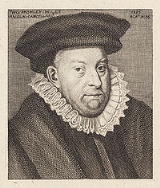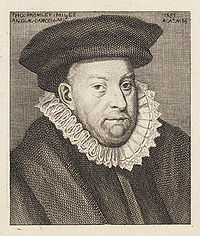
Thomas Bromley
Encyclopedia

England
England is a country that is part of the United Kingdom. It shares land borders with Scotland to the north and Wales to the west; the Irish Sea is to the north west, the Celtic Sea to the south west, with the North Sea to the east and the English Channel to the south separating it from continental...
lord chancellor.
Life
He was born in StaffordshireStaffordshire
Staffordshire is a landlocked county in the West Midlands region of England. For Eurostat purposes, the county is a NUTS 3 region and is one of four counties or unitary districts that comprise the "Shropshire and Staffordshire" NUTS 2 region. Part of the National Forest lies within its borders...
, was educated at Oxford University and then called to the bar at the Middle Temple
Middle Temple
The Honourable Society of the Middle Temple, commonly known as Middle Temple, is one of the four Inns of Court exclusively entitled to call their members to the English Bar as barristers; the others being the Inner Temple, Gray's Inn and Lincoln's Inn...
. Through family influence as well as the patronage of Sir Nicholas Bacon, the lord keeper, he quickly made progress in his profession.
In 1566 he was appointed recorder of London
London
London is the capital city of :England and the :United Kingdom, the largest metropolitan area in the United Kingdom, and the largest urban zone in the European Union by most measures. Located on the River Thames, London has been a major settlement for two millennia, its history going back to its...
, and in 1569 he became solicitor-general. He sat in parliament successively for Bridgnorth
Bridgnorth
Bridgnorth is a town in Shropshire, England, along the Severn Valley. It is split into Low Town and High Town, named on account of their elevations relative to the River Severn, which separates the upper town on the right bank from the lower on the left...
, Wigan
Wigan
Wigan is a town in Greater Manchester, England. It stands on the River Douglas, south-west of Bolton, north of Warrington and west-northwest of Manchester. Wigan is the largest settlement in the Metropolitan Borough of Wigan and is its administrative centre. The town of Wigan had a total...
and Guildford
Guildford
Guildford is the county town of Surrey. England, as well as the seat for the borough of Guildford and the administrative headquarters of the South East England region...
. On the death of Sir Nicholas Bacon in 1579 he was appointed lord chancellor.
He presided over the commission which tried Mary, Queen of Scots, in 1586, but the strain of the trial and the responsibility of ordering the execution of a monarch proved too much for his strength, and he died soon after. He was buried in Westminster Abbey
Westminster Abbey
The Collegiate Church of St Peter at Westminster, popularly known as Westminster Abbey, is a large, mainly Gothic church, in the City of Westminster, London, United Kingdom, located just to the west of the Palace of Westminster. It is the traditional place of coronation and burial site for English,...
.
Family
His wife was Elizabeth Fortesque, daughter of Sir Adrian Fortesque, and by her he had four sons and four daughters. His eldest son was Sir Henry BromleyHenry Bromley (died 1615)
Sir Henry Bromley was an English landowner and politician who sat in the House of Commons at various times between 1584 and 1604....
.
Legacy
His rule in Shelley's CaseRule in Shelley's Case
The Rule in Shelley's Case is a rule of law that may apply to certain future interests in real property and trusts created in common law jurisdictions...
is a landmark in the history of English real property law.
Queen Elizabeth I granted the Manor of Great Malvern in Malvern, Worcestershire
Malvern, Worcestershire
Malvern is a town and civil parish in Worcestershire, England, governed by Malvern Town Council. As of the 2001 census it has a population of 28,749, and includes the historical settlement and commercial centre of Great Malvern on the steep eastern flank of the Malvern Hills, and the former...
, to Sir Thomas, and it remained in the possession of his family through several generations, until sold by Lord Mountfort
Henry Bromley, 1st Baron Montfort
Henry Bromley, 1st Baron Montfort , was a British landowner and politician.Bromley was the only son of John Bromley and the grandson of John Bromley, both Knights of the Shire for Cambridgeshire. His mother Marcy died in childbed. He was educated at Clare College, Cambridge...
in about 1740.

